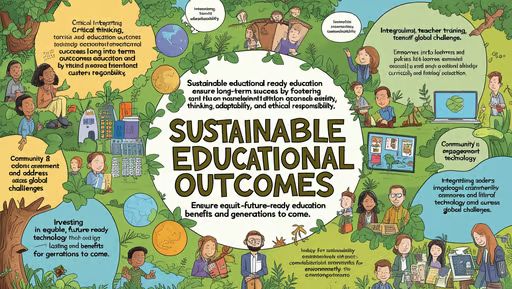Introduction
Sustainable Educational Outcomes for Long-Term Success, Sustainable educational outcomes refer to the long-term benefits of learning that extend beyond immediate academic achievements. These outcomes encompass skills, knowledge, and attitudes that empower individuals to contribute meaningfully to society while adapting to evolving global challenges. In an era marked by rapid technological advancements and environmental concerns, education must prioritize sustainability to ensure learners are equipped for future demands.
A sustainable education system focuses on equity, accessibility, and relevance. It ensures that learning is not just about passing exams but fostering critical thinking, problem-solving, and ethical decision-making. By integrating sustainability into curricula, institutions can cultivate responsible citizens who understand the interconnectedness of social, economic, and environmental systems.
This article explores key aspects of sustainable educational outcomes, including curriculum design, teacher training, policy frameworks, and community engagement. Each section provides insights into how stakeholders can collaborate to create resilient and inclusive learning environments that stand the test of time.
The Role of Curriculum Design in Sustainable Education
A well-structured curriculum is the backbone of sustainable educational outcomes. Traditional models often emphasize rote memorization, but a sustainable curriculum prioritizes experiential learning, interdisciplinary approaches, and real-world applications. Subjects like environmental science, social justice, and digital literacy should be integrated to prepare students for contemporary challenges.
Project-based learning (PBL) is an effective strategy, encouraging students to work on long-term assignments that address community issues. For example, a sustainability-focused PBL might involve designing a waste management system for their school, blending science, math, and civic responsibility.
Additionally, curricula should be adaptable, allowing updates based on emerging global trends. Collaboration between educators, policymakers, and industry experts ensures that learning remains relevant. By embedding sustainability into every subject, schools can foster a generation of innovators and problem-solvers.
Teacher Training and Professional Development
Teachers play a pivotal role in achieving sustainable educational outcomes. However, many educators lack training in sustainability pedagogies. Professional development programs must equip teachers with strategies to integrate sustainability into their lessons effectively.
Workshops on green teaching practices, such as reducing paper usage or incorporating renewable energy concepts, can enhance classroom sustainability. Moreover, teachers should be trained in fostering inclusive classrooms where diverse perspectives on sustainability are valued.
Mentorship programs and peer-learning networks can further support educators in adopting innovative teaching methods. Governments and institutions must invest in continuous teacher training to ensure educators remain updated on best practices for sustainable education.
Policy Frameworks and Government Support
Sustainable education requires strong policy frameworks that prioritize long-term learning goals. Governments must allocate funding for green schools, renewable energy in education, and access to digital resources for underserved communities. Policies should also encourage partnerships between schools, NGOs, and businesses to enhance sustainability initiatives.
Standardized assessments should evolve to measure not just academic performance but also students’ ability to apply knowledge sustainably. For instance, evaluations could include projects on climate action or social entrepreneurship.
International collaboration, such as UNESCO’s Education for Sustainable Development (ESD) initiative, provides a blueprint for nations to align their education systems with global sustainability goals. By adopting such frameworks, countries can ensure cohesive progress toward sustainable education.
Community Engagement and Stakeholder Involvement
Education does not exist in isolation—community involvement is crucial for sustainability. Parents, local leaders, and businesses must collaborate with schools to reinforce sustainable practices beyond the classroom.
Community-based programs, such as tree-planting drives or recycling campaigns, can extend learning into real-world action. Schools can also partner with local industries to provide students with hands-on experience in sustainability-related careers.
Furthermore, student-led initiatives empower young learners to take ownership of their education. Eco-clubs, debate teams on sustainability topics, and youth councils can foster leadership and civic responsibility.
Technology and Innovation in Sustainable Learning
Digital tools can enhance sustainable education by providing accessible and interactive learning experiences. Online platforms, virtual labs, and AI-driven tutoring systems can personalize education while reducing resource consumption.
E-books and digital assignments minimize paper waste, while renewable energy-powered computer labs demonstrate sustainability in action. However, ensuring equitable access to technology remains a challenge that policymakers must address.
Innovations like gamification can also make sustainability education engaging. Apps that reward students for eco-friendly behaviors or simulations that teach climate science can deepen understanding and retention.
Conclusion
Sustainable educational outcomes are essential for building a resilient and equitable future. By rethinking curricula, investing in teacher training, strengthening policies, engaging communities, and leveraging technology, education systems can produce lifelong learners who contribute positively to society.
The journey toward sustainability in education requires collective effort—governments, educators, students, and communities must work together. Only then can we ensure that learning transcends the classroom, creating a lasting impact on individuals and the planet.

Wake up your way with this premium CD player alarm clock radio. Whether you prefer to rise with the AM/FM radio, your favorite CD, or a standard buzzer, this versatile alarm clock with CD player has you covered. Its intuitive design includes dual alarms, a large digital display, snooze/sleep timers, and USB charging for your phone. Enjoy high-quality stereo sound from a compact unit that fits easily on any bedside table or shelf. The best clock radios with CD player combine retro functionality with modern convenience—and this one leads the pack.
This all-in-one clock radio CD player is more than just an alarm—it’s a full media hub. Along with a traditional CD player, it features AM/FM radio, Bluetooth connectivity, and a wireless remote control. Dual alarms make it easy to set different wake times, while the large LED display ensures easy readability. With rich stereo sound and multiple playback options, it’s one of the best clock radios with CD player and Bluetooth functionality. Great for music lovers who value versatility in a radio alarm clock CD player setup.
Very interesting topic, regards for posting. “The great leaders have always stage-managed their effects.” by Charles De Gaulle.
You need to be a part of a contest for one of the finest blogs on the net.
I’m going to highly recommend this website!